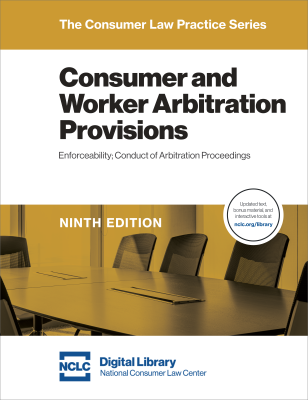- The defendant fails to comply with the terms of its own arbitration clause, such as by failing to promptly pay arbitration fees or participating in the arbitration in bad faith, Id. § 8.4;
- The defendant initially engages in court litigation, such as by filing counterclaims, motions for dismissal or summary judgment, or conducting discovery, Id. § 8.3.2;
- The defendant engages in litigation in a related lawsuit, Id. § 8.3.2.2;
- The defendant excessively delays a motion to require arbitration, Id. § 8.3.2.6;
- The defendant litigates an individual action while claiming other class members must go to arbitration, Id. § 8.3.2.7;
- The defendant expressly waives the the right to compel arbitration, Id. § 8.3.2.8a.
Importantly, in all of these contexts, it is the court and not the arbitrator who should determine if the arbitration requirement applies. Even if there is a clause delegating the issue of arbitrability to the arbitrator, the same defendant conduct that puts the arbitration requirement in doubt also puts this delegation clause in doubt. Moreover, determining the effect of the defendant’s conduct in the litigation should not be considered an issue of “arbitrability,” as that term is normally understood. Thus clauses that delegate arbitrability questions to the arbitrator do not “clearly and unmistakably” delegate waiver issues See generally NCLC’s Consumer Arbitration Agreements for a detailed discussion why the court and not the arbitrator will determine if the defendant’s conduct prevents enforcement of the arbitration requirement.
Defendant’s Conduct in the Arbitration Proceeding The defendant’s failure to comply with the terms of its own arbitration clause may allow a court to hold that the defendant has waived or defaulted on the right to require arbitration—one who seeks to enforce a contract must show that he has complied with the contract. Id. § 8.4.1.
Defendants often utilize arbitration clauses as a way to make cases go away. When the consumer proceeds with the arbitration, the defendant may refuse to pay the high costs of arbitration—the arbitration agreement will require the defendant to pay half or even all of the costs. Such a refusal should be considered a waiver of the arbitration requirement. Id. § 8.4.4. Other conduct in the arbitration, such as excessive delay, may also show bad faith and be grounds to find the arbitration requirement waived. Id. § 8.4.3.
Once it is clear that the arbitrator will not allow the arbitration to proceed because of the defendant’s conduct, the consumer then has three options: (1) ask the arbitrator to issue sanctions or award default judgment depending on the forum’s rules; (2) go to court and seek a judicial order requiring the party to comply with the forum’s rules under FAA § 4; or (3) discontinue the arbitration or wait for the arbitrator to decline to administer the arbitration and then file a new complaint in court or, if the court had stayed and not dismissed the original action, ask the court to lift the stay under FAA § 3. Id. § 8.4.2.
Defendant’s Conduct in the Court Proceeding Defendants initially may proceed with court litigation before raising the arbitration requirement—either because they thought (mistakenly) they could win in court quickly or were initially unaware of the arbitration requirement. Courts will look at the totality of circumstances to see if this conduct waives the right to require arbitration, particularly where the conduct prejudices the consumer. Id. § 8.3.2.1.
Conduct that may amount to waiver includes:
- Filing pleadings in a case, such as a complaint or counterclaim, Id. § 8.3.2.3;
- Bringing a motion on the merits, such as a motion to dismiss or for summary judgment, Id. § 8.3.2.4;
- Litigating on the merits almost to the point of trial or filing numerous motions, Id.;
- Conducting extensive discovery, Id. § 8.3.2.5;
- Excessively delaying a request to compel arbitration, Id. § 8.3.2.6.
Defendant’s Conduct in a Different Court Proceeding A party may waive the right to compel arbitration in one proceeding by participating in another court action between the same parties dealing with similar issues. For example, after proceeding with a collection action in court, that collector may than raise an arbitration requirement when the consumer subsequently brings a separate Fair Debt Collection Practices Act case against that collector or collection lawyer. There is some increasing precedent concluding that litigating the collection action in court waives the right to compel arbitration of the later-filed FDCPA case. Id. § 8.3.2.2.
Impact on Class Action of Defendant’s Conduct in Litigating Claims of Named Plaintiff Defendants facing class actions may litigate in court pre-class certification, but then when that litigation does not turn in their favor, s argue that the class cannot be certified because the absent class members have entered into arbitration requirements. Increasingly, courts find that pre-certification conduct can waive the right to compel arbitration of absent-class member claims. Id. § 8.3.2.7.
Defendant’s Conduct May Explicitly Waive Arbitration Requirement It is not surprising that courts will give effect to a defendant’s explicit waiver of the arbitration requirement. What is surprising is the number of contexts where this may occur.
Examples of where a party has explicitly waived the arbitration requirement include where the party initially had opposed a motion to compel arbitration, where the party has withdrawn a prior motion to compel arbitration, or has otherwise indicated that the court should resolve the matter. Id. § 8.3.2.8a.


